
Dr. Gisela Kopp
Hector Pioneer Fellow
Zukunftskolleg/Department of Biology
University of Konstanz
Room: Y216
+49-(0)7531-88 5657
gisela.kopp@uni-konstanz.de
Sprecherin | Die Junge Akademie
chair@diejungeakademie.de
Sociality & Evolution
The formation of societies by individual animals is one of the major transitions in evolution and has occurred independently and repeatedly across the animal kingdom. Much effort has been spent on understanding the causes for the evolution of sociality in general and specific forms of sociality in particular. The question whether sociality entails consequences in terms of evolutionary divergence has received less attention and our understanding of how different forms of sociality might influence macroevolutionary dynamics remains obscure.
Two lines of evidence support that sociality plays an important role in macroevolution. First, there is ample evidence that traits of animal societies directly influence population differentiation and genetic diversity. Population differentiation is a key step during speciation and factors affecting population differentiation may consequently impact speciation. Second, several studies show macroevolutionary consequences of differences in social system traits. However, there remains a lack of synthesis across disparate taxa and a coherent understanding of how sociality influences diversification is still missing.
We aim to fill these gaps and provide a nuanced understanding on the sociality-diversification link across the animal kingdom. Our conceptual framework pictures that different forms of sociality influence population differentiation and genetic diversity, which subsequently alter diversification rates.
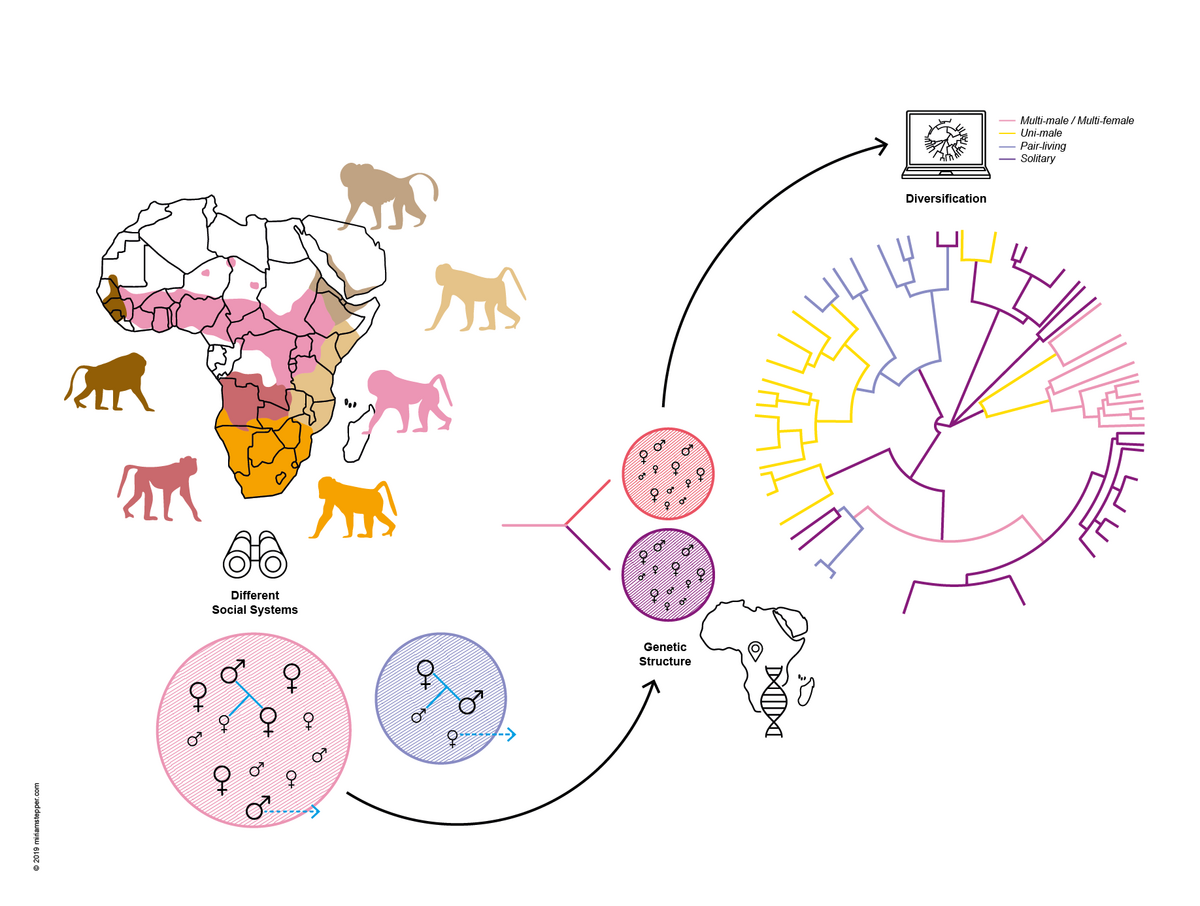
Key questions
I. Which data and analyses are needed to efficiently describe diverse social systems across taxa in a quantitative way?
II. Do these descriptors consistently correlate with measures of genetic structure and diversity across taxa?
III. Is genetic structure and diversity a predictor of diversification and species richness?
IV. Do certain behavioural traits, through their effects on diversity and differentiation, impact diversification patterns on a macroevolutionary scale?
By formulating an explicit framework and addressing all the links within, we will reach a better understanding of the role of interspecific behavioural differences in population dynamics and speciation processes. The force of behavioural variation in macroevolution has been largely ignored and its appreciation will serve as a substantial complement to classical views on the causes of speciation. This will constitute an essential step towards understanding the complex interplay between ecology, social behaviour, and adaptive evolution and the underlying genomic processes.
To accomplish this, we combine meta-analyses across a diverse set of animals, with case studies, for which behavioural and genomic data is collected in wild populations.
Ongoing Projects
Establishing fecalFACS as a method to investigate the genomic relatedness networks that underlie social interaction networks in natural animal populations (with Dr. U. Kalbitzer, PD D. Dechmann, MPI-AB)
How genomic relatedness within and across groups shapes the behavior of vulturine guineafowl (with Dr. D. Papageorgiou, Prof. D. Farine, University of Zurich)
Using non-human primates to unravel ancient biocultural exchange networks (with Prof. N. J. Dominy, Dartmouth College)
The impact of ranging behaviour on genetic diversity and structure in mammals (with Dr. K. Safi, MPI-AB; Dr. M. Tucker, Radboud University, Prof. T. Müller, BiK-F)
Evolutionary consequences of social system variation in primates (with Dr. H. Morlon, ENS Paris)
Population genomics of a fission-fusion society: the influence of relatedness on social networks in Thomson's Gazelles (with Dr. B. Costelloe, MPI-AB)
Comparative sociogenetics of sympatric neotropical bats (with PD D. Dechmann, MPI-AB)
Publications
Peer-reviewed scientific journal publications (*supervised student co-author)
(20.) Kopp GH, Papageorgiou D, *Dorendorf T, Hume B, Nyaguthii B, Kraus RHS, Farine DR (in prep) Low coverage whole genome sequencing sheds new light on the multilevel social organisation of vulturine guineafowl.
19. *Grathwol F, Roos C, Zinner D, Hume B, Porcier S, Berthet D, Cuisin J, Merker S, Ottoni C, Van Neer W, Dominy N, Kopp GH (2023) Adulis and the transshipment of baboons during classical antiquity. eLIFE 2023;12:e87513 PDF. Preprint * covered by e.g. The New Scientist, The Times, The Hindu, Deutschlandfunk, Ars Technica
18. Kopp GH, Sithaldeen R, Trede F, *Grathwol F, Roos C, Zinner D (2023) A comprehensive overview of baboon phylogenetic history. Genes 14(3):614. PDF
17. Fischer J, Higham JP, Alberts SC, Barrett L, Beehner JC, Bergman TJ, Carter A, Collins A, Elton S, Fagot J, Ferreira da Silva M, Hammerschmidt K, Henzi P, Jolly C, Knauf S, Kopp GH, Rogers J, Roos C, Ross C, Seyfarth RM, Silk J, Snyder-Mackler N, Städele V, Swedell L, Wilson ML, Zinner D (2019) The natural history of model organisms: Insights into the evolution of social systems and species from baboon studies. eLIFE 8:e50989. PDF
16. Walker JA, …, Baboon Genome Analysis Consortium, Batzer MA (2019) Alu insertion polymorphisms shared by Papio baboons and Theropithecus gelada reveal an intertwined common ancestry. Mobile DNA 10: 46. PDF
15. Rogers J, …, Kopp GH, et al. (2019) The comparative genomics and complex population history of Papio baboons. ScienceAdvances 5(1): eaau6947. PDF * covered by e.g. Phys.org, VBiO, Göttinger Tageblatt, DNA Science Blog
14. Jordan, VE, …, Baboon Genome Analysis Consortium, et al. (2018) A Computational Reconstruction of Papio Phylogeny Using Alu Insertion Polymorphisms. Mobile DNA 9: 13. PDF
13. Steely CJ, Baker JN, Walker JA, Loupe CD, Baboon Genome Analysis Consortium, Batzer MA (2018) Analysis of Lineage-Specific Alu Subfamilies in the Genome of the Olive Baboon, Papio anubis. Mobile DNA 9: 10. PDF
12. Ferreira da Silva MJ, Kopp GH, Casanova C, Godinho R, Minhós T, Sá R, Zinner D, Bruford MW (2018) Disrupted dispersal and its genetic consequencs: comparing protected and threatened baboon populations (Papio papio) in West Africa. PLoS ONE 13(4): e0194189. PDF
11. Fischer J, Kopp GH, Dal Pesco F, Goffe A, Hammerschmidt K, Kalbitzer U, Klapproth M, Maciej P, Ndao I, Patzelt A, Zinner D (2017) Charting the neglected West: the social system of Guinea baboons. Am J Phys Anthropol 162: 15-31. PDF
10. Kalbitzer U, Roos C, Kopp GH, Butynski TM, Knauf S, Zinner D, Fischer J (2016) Insights into the genetic foundation of aggression in Papio and the evolution of two length-polymorphisms in the promoter regions of serotonin-related genes (5-HTTLPR and MAOALPR) in Papionini. BMC Evol Biol 16: 121. PDF * covered by BMC OnBiology Blog
9. Snyder-Mackler N, Majoros WH, Yuan ML, Shaver AO, Gordon, JB, Kopp GH, Schlebusch SA, Wall JA, Alberts SC, Mukherjee S, Zhou X, Tung J (2016). Efficient genome-wide sequencing and low coverage pedigree analysis from non-invasively collected samples. Genetics 203: 699–714. PDF * covered by Genes to Genomes Blog
8. Kopp GH, Patzelt A, Fischer J, Roos C, Zinner D (2015) Population genetic insights into the social organization of Guinea baboons (Papio papio): Evidence for female-biased dispersal. Am J Primatol. 77: 878-889. PDF
7. Kopp GH, Roos C, Butynski TM, Wildman DE, Alagaili AN, Groeneveld LF, Zinner D (2014) Out of Africa, but how and when? The case of hamadryas baboons (Papio hamadryas). J Hum Evol 76: 154-164. PDF * notable paper on John Hawks Weblog
6. Patzelt A, Kopp GH, Ndao I, Kalbitzer U, Zinner D, Fischer J (2014) Male tolerance and male-male bonds in a multi-level primate society. PNAS 111(41): 14740–14745. PDF * covered by e.g. ScienceDaily, Phys.org, Scinexx, Süddeutsche Zeitung
5. Kopp GH, Ferreira da Silva MJ, Fischer J, Brito JC, Regnaut S, Roos C, Zinner D (2014) The influence of social systems on patterns of mitochondrial DNA variation in baboons. Int J Primatol 35: 210-225. PDF
4. Yang M, Yang Y, Cui D, Fickenscher G, Zinner D, Roos C, Brameier M (2012) Population genetic structure of Guizhou snub-nosed monkeys (Rhinopithecus brelichi) as inferred from mitochondrial control region sequences, and comparison with R. roxellana and R. bieti. Am J Phys Anthropol 147: 1-10. PDF
3. Fischer J, Semple S, Fickenscher G, Jürgens R, Kruse E, Heistermann M, Amir O (2011) Do women’s voices provide cues of the likelihood of ovulation? The importance of sampling regime. PLoS ONE 6: e24490. PDF * covered by e.g. Deutsche Welle, Süddeutsche Zeitung
2. Patzelt A, Zinner D, Fickenscher G, Diedhiou S, Camara B, Stahl D, Fischer J (2011) Group composition of Guinea baboons (Papio papio) at a water place suggests a fluid social organization. Int J Primatol 32: 652-668. PDF
1. Lehmann J, Fickenscher G, Boesch C (2006) Kin biased investment in wild chimpanzees. Behaviour, 143: 931-955. PDF
Book chapters
1. Zinner D, Fickenscher G, Roos C (2013) Family Cercopithecidae (Old World Monkeys). In: RA Mittermeier, DE Wilson (eds.) Handbook of the Mammals of the World, Volume 3: Primates. Lynx Ediciones, Barcelona. Pp. 550-627
Edited Book
1. Holzapfel M (2023) Young Scientists - 30 Forschende und ihre Wege in die Wissenschaft. Die Junge Akademie (ed). Hanser Verlag. PREVIEW
Technical Report
1. Wallis J, Alonso C, Barlow C, Brito J, Ferreira da Silva MJ, Hernansaiz A, Kopp GH, Vale C, Zinner D (2020) Papio papio. The IUCN Red List of Threatened Species 2020: e.T16018A17952926. LINK
Code
1. Kopp GH, Dorendorf T, Hume B. (2022) A workflow for sWGS genotype likelihood calling and relatedness estimation (with no known variant sets). Nextflow Pipeline LINK
(Science) Policy publications
3. ALLEA’s Working Group ERA (2022) ALLEA statement for an ERA of freedom and excellence. Berlin: ALLEA LINK
2. Eichhorn A, Fuchs SW, Kopp GH, Kretschmer R, Merl T, Segets D, de Wolff T (2022) Perspektiven auf das Wissenschaftszeitvertragsgesetz. Berlin: Die Junge Akademie LINK
1. Kopp GH, Kretschmer R (2020) Ein Tarif für Doktoranden? Ja – wir brauchen eine einheitliche Bezahlung für Promovierende! Die ZEIT 46/2020:41 LINK
Curriculum vitae
download CV
Scientific Career
Since 03/2018 Research Fellow, Zukunftskolleg, University of Konstanz
Additional affiliations: Department of Biology & Centre for the Advanced Study of Collective Behaviour, University of Konstanz; Department of Migration, Max Planck Institute of Animal Behavior
06/2016 – 02/2018 Postdoctoral Scientist; Disease Ecology and Evolutionary Genetics Group, Department of Migration and Immuno-Ecology, Max Planck Institute for Ornithology, Radolfzell
07/2010 – 04/2015 Doctoral Scientist, Cognitive Ethology Laboratory, German Primate Center, Göttingen
04 – 09/2007 Field assistant, Centre de Recherche de Primatologie Simenti, Senegal
12/2004 – 04/2009 Student research assistant, Cognitive Ethology Laboratory, German Primate Center, Göttingen
10/2003 – 04/2004 Research intern, Department of Primatology, Max Planck Institute for Evolutionary Anthropology, Leipzig
Education
07/2010 – 04/2015 PhD, Biodiversity and Ecology, Georg-August-University Göttingen
Dissertation: Gene Flow Dynamics in Baboons: The Influence of Social Systems. PDF
Grade: summa cum laude
10/2004 – 05/2010 Diploma, Biology (Major: Anthropology, Zoology, Human Genetics), Georg-August-University Göttingen
Diploma thesis: Genetic Population Structure of Free-Ranging Guinea Baboons (Papio papio) in the Niokolo-Koba National Park, Senegal.
Advisors: Dr. D. Zinner, Prof. Dr. J. Fischer
Grade: sehr gut
Grants & Awards
Awards & Honours
2023 Harris Distinguished Visiting Professorship, Dartmouth College
2022 University Council Award, University Council of the University of Konstanz
2020 Member of Die Junge Akademie at the Berlin-Brandenburg Academy of Sciences and Humanities (BBAW) and the German National Academy of Sciences Leopoldina
2016 DPZ sponsorship Award, Sponsorship Society of the German Primate Center
2010 GfP-Award for Young Researchers, Gesellschaft für Primatologie
Fellowships & Grants
2022 Workshop grant, Wenner-Gren Foundation
2021 Project grant, Die Junge Akademie
2021 Project grant, Die Junge Akademie
2018 Hector Pioneer fellowship, Hector Stiftung II
2017 Brigitte Schlieben Lange Postdoc fellowship, Ministerium für Wissenschaft, Forschung und Kunst Baden-Württemberg
2016 Research grant, German Society for Mammalian Biology
2016 Postdoc stipend, Sponsorship Society of the German Primate Center
2014 Stipend, Christiane Nüsslein-Volhard-Foundation
2014 Conference travel grant, DAAD
2012 Research grant, The Leakey Foundation
2012 Field travel grant, DAAD
2011 Student bursary, European Federation for Primatology
2011 Conference travel grant, Universitätsbund Göttingen
2010 Conference travel grant, DAAD
2009 Field travel grant, DAAD
2009 Field research grant, Christian-Vogel-Fonds
Grants & Fellowships supported as Host
2023 Deutsche Bundesstiftung Umwelt MOE Fellowship, Nia Toshkova, National Museum of Natural History, Bulgarian Academy of Sciences/Bulgaria
2022 Zukunftskolleg Senior Fellowship, Prof. Nathaniel Dominy, Dartmouth College/US
2022 Zukunftskolleg Senior Fellowship, Prof. James Higham, New York University/US
2022 Zukunftskolleg Senior Fellowship, Prof. Amanda Melin, University of Calgary/Canada
Intramural competitive research funding, University of Konstanz
2021 & 2022 Medium & small project grant, Centre for the Advanced Study of Collective Behaviour
2020 Konstanzia fellowship, Equal Opportunities Office
2019 Internationalisation measures grant, International Office
2018 – 2023 Flexible working conditions for Postdocs with Family Duties, Equal Opportunities Office
2017, 2020 Young scholar fund, Committee on Research
2017 Interdisciplinary collaborative projects grant, Zukunftskolleg
2017 – 2018 Mentorship programme, Zukunftskolleg
Outreach & Public Debates
Zukunft der BBAW, Panel discussion, Leibniztag of the Berlin-Brandenburg Academy of Sciences and Humanities (BBAW). Berlin, 16.6.2023.
Wie geht es Hannah in anderen OECD-Ländern? Reformoptionen für wissenschaftliche Karrieren, Panel discussion, OECD Berlin Centre. Online, 10.1.2023.
Young Scientists - 30 Forschende und ihre Wege in die Wissenschaft, Children’s book (in press, Hanser Verlag), contribution to conceptualization and content LINK
An evening with Dian, introductory talk to “Gorillas in the Mist”, SFB 969, Equal Opportunity Office and Lumière University Cinema: Movie series with female role models. Konstanz, 8.6.2022.
„Wissen – Handeln?“, Podcast: discussions on science, outreach and activism with various researchers, contribution to conceptualization and content. Since 2021. LINK
#IchbinHanna – Machen Zeitverträge die Wissenschaft in Deutschland kaputt? Radio interview at SWR2 Impuls. 17.6.2021.
Research and family in the pandemic, Panel discussion, ERUA event: Our Europe today. Online, 17.6.2021.
Junge Forscherinnen ausgebremst, Panel discussion, Körber-Stiftung. Online, 6.5.2021
Migration – Perspective from Biology, lightning talk at midissage of “Anima Mundi” exhibition, UBiAS topic of the year event: Migration Stories, University of Konstanz. Konstanz, 25.6.2019
[Damals, neu an der Uni…], contribution to Facebook-Portrait Series of the University of Konstanz. 20.4.2018, LINK
A Primer to the German Academic System, contribution to the “Academic life histories” blog. 24.4.2018, LINK
-
Team
- Vivian Kneipp
Student Research Assistant, Primates in Antiquity Project
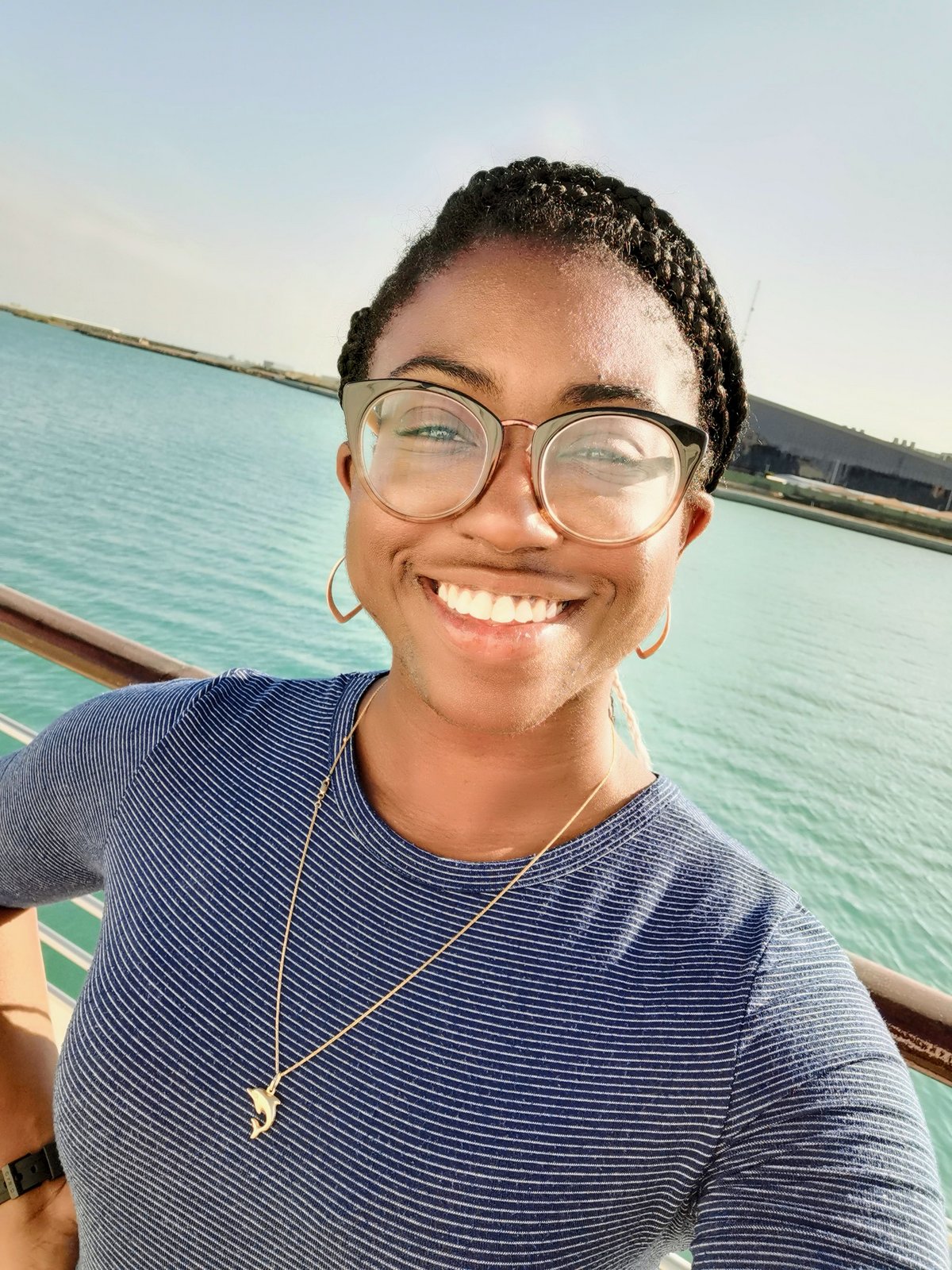
- Alyssa Bell
Laboratory Technical Assistant
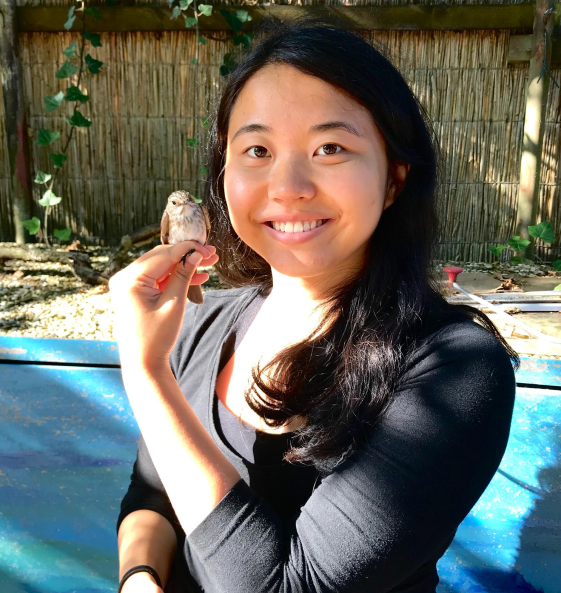
- Ellen Ye
Student Teaching Assistant, Animal Sociality Seminar
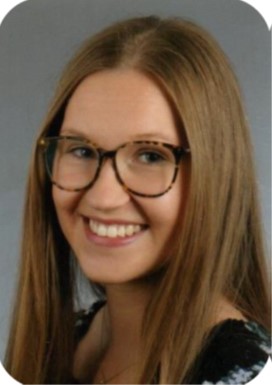
- Vanessa Nalewaja
Student Research Assistant, WüstenWissen (Die Junge Akademie Projekt)
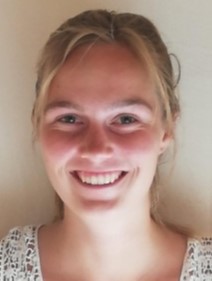
- Hanna Rohr
Student Research Assistant, Initiative Diversität (Die Junge Akademie Projekt)
Guest Researchers
- Prof. Nathaniel Dominy (Dartmouth College, USA)
Zukunftskolleg Senior Fellowship, Using primate population genetics to map ancient trade routes
- Prof. James Higham (New York University, USA)
Zukunftskolleg Senior Fellowship, Expanding baboon studies in Konstanz via new collaborations
- Prof. Amanda Melin (University of Calgary, Canada)
Zukunftskolleg Senior Fellowship, Enhancing methods and theory in primate genomics and foraging decisions
Alumni
- Nia Toshkova
Guest Doctoral Student, Deutsche Bundesstiftung Umwelt MOE Fellowship
- Riya Mathur
Student Research Assistant, FecalFACS Project
- Zsolt Palmer
Student Research Intern, Parlamentarisches Patenschafts-Programm des Deutschen Bundestages
- Patricia Bächtle
Research Assistant, FecalFACS project
- Melina Dietzer,
Research Assistant, FecalFACS project [now PhD student with Prof. I Storch at U Freiburg]
- Till Dorendorf
Student Research Assistant, Guineafowl genomics [now PhD student with Prof. O. Mayans at U Konstanz]
- Evi Fricke
Technical Assistant, Molecular lab [now retired]
- Katharina Gergen
Master Student, U. bilobatum population genetics [now Technician at BIPSO GmbH]
- Franziska Grathwol
Master Student, Baboon Phylogeography [now Landschaftsplanung & Naturschutz at Stadtplanungs-amt Fellbach]
- Delvina Hoti
Student Research Assistant, microsatellite analysis [now Quality Control Analyst at Roche]
- Olga Klat
Student Research Assistant, microsatellite analysis [now at Numab Therapeutics AG]
- Myriam Knöpfle
Research Assistant, genetic diversity in mammals [now PhD student with Dr. A. Jordan at MPI-AB]
- Jenna Kohles
Student Research Assistant, microsatellite analysis [now PhD student with PD Dr. D. Dechmann at MPI-AB]
